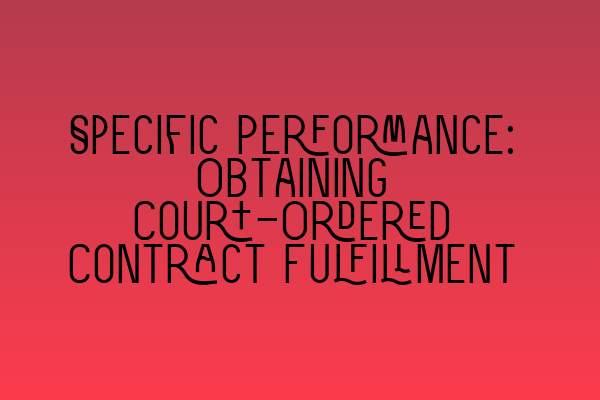Specific Performance: Obtaining Court-Ordered Contract Fulfillment
Contracts are the foundation of business transactions, serving as legally binding agreements between parties. However, there are occasions when one party fails to fulfill their contractual obligations, creating a breach of contract situation. In such cases, the injured party may seek specific performance, a legal remedy that aims to enforce the performance of the contract as agreed upon.
In this blog post, we will explore the concept of specific performance, its requirements, and the process of obtaining court-ordered contract fulfillment.
Understanding Specific Performance
Specific performance is a equitable remedy available in contract law that allows the court to order the breaching party to fulfill their contractual obligations rather than awarding monetary damages. It is usually sought when the subject matter of the contract is unique or when monetary compensation would not adequately compensate the non-breaching party.
The key principle behind specific performance is the idea that each party should receive what they bargained for in the contract. It is typically available for contracts involving real estate, rare goods, or unique services.
Requirements for Specific Performance
In order to obtain specific performance, the non-breaching party must demonstrate certain requirements:
- Valid and Enforceable Contract: The non-breaching party must prove that a valid and enforceable contract exists between the parties. This includes establishing the offer, acceptance, consideration, and the intention to create legal relations.
- Material Breach: The non-breaching party must demonstrate that the other party has committed a material breach of the contract. A material breach is a failure to perform a major obligation under the contract, significantly affecting the value or purpose of the agreement.
- Availability of the Subject Matter: Specific performance is more likely to be granted if the subject matter of the contract is unique, such as a one-of-a-kind artwork or a specific piece of real estate.
- Feasibility of Enforcement: The court will consider whether it is feasible and practical to enforce specific performance. If the court finds it impossible or highly impractical to enforce the contract, it may refuse to grant specific performance and award monetary damages instead.
It is important to note that specific performance is a discretionary remedy, meaning that the court has the discretion to decide whether or not to grant it based on the particular circumstances of the case.
The Process of Obtaining Specific Performance
If you believe that you are entitled to specific performance, here are the general steps involved in the process:
- Consultation with a Contract Law Solicitor: Seek legal advice from an experienced contract law solicitor who can assess the merits of your case and guide you through the process.
- Preparation of the Claim: Your solicitor will help you prepare the necessary legal documents, including a claim form stating your case and the remedies sought.
- Issuing the Claim: The claim form will be issued and served to the breaching party, officially initiating the legal proceedings.
- Court Proceedings: The case will be heard in court, where both parties present their arguments and evidence. The court will consider the requirements for specific performance and assess the feasibility of enforcement.
- Court Decision: Based on the evidence and legal arguments presented, the court will make a decision on whether to grant specific performance or award alternative remedies, such as monetary damages.
- Enforcement of the Court Order: If the court grants specific performance, the breaching party will be legally obliged to fulfill their contractual obligations. Failure to comply with the court order may result in contempt of court and further legal consequences.
It is worth mentioning that the process of obtaining specific performance can be complex and time-consuming. Therefore, it is crucial to seek the assistance of a knowledgeable contract law solicitor to navigate through the legal procedures effectively.
Conclusion
Specific performance is a valuable legal remedy that allows the court to enforce the fulfillment of contractual obligations. It is sought when monetary compensation is inadequate or when the subject matter of the contract is unique. Understanding the requirements and process of obtaining specific performance is essential for those who find themselves in breach of contract situations.
If you need expert legal assistance with specific performance or any other aspect of contract law, SQE Contract Law is here to help. Contact our team of experienced solicitors to discuss your case and explore the available legal options.
Related Articles:
